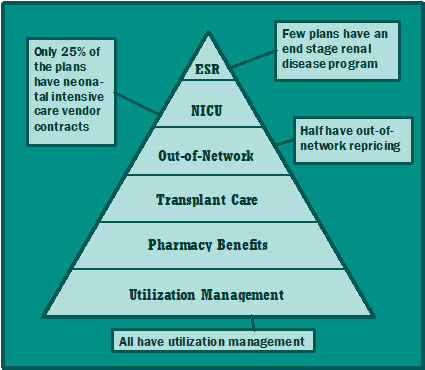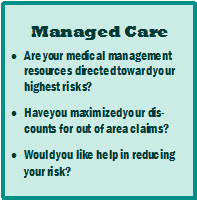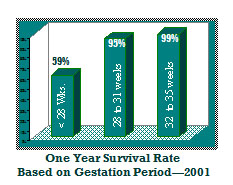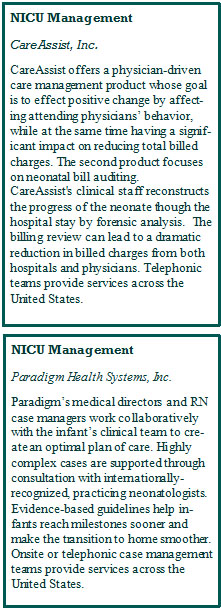Employers, insurers and federal lawmakers increasingly are focusing on early intervention for potential chronic diseases to avoid hospital admissions and complications later in the disease process. Disease management is one of the fastest-growing areas in health care.
Federal Efforts
The federal government launched a disease management initiative to test capitated payment arrangements with qualified organizations for the case management of specific diseases. The targeted populations include Medicare beneficiaries with chronic illnesses and special populations, such as those eligible for both Medicare and Medicaid and the frail elderly. Historically, a small proportion of Medicare beneficiaries has accounted from the major proportion of Medicare expenditures. In 1996, 12.1% of all Medicare enrollees accounted for 75.5% ($126.1 billion) of all Medicare fee-for-service program payments.1
Many of these beneficiaries have specific, chronic diseases and the majority of the care is for repeat hospitalizations. As the general population continues to age, the estimated cost of care for these individuals is expected to grow dramatically.
Private Sector Efforts
The level of interest regarding disease management is increasing. The Disease Management Association of America was formed to advance the practice of disease management and the National Association of Quality Assurance has established standards for disease management programs. Managed care organizations usually have some form of disease management programs in place, since there are clear incentives for managing care effectively. The programs may be internally developed or outsourced to a disease management vendor.
Program Features
The definition of disease management and the program objectives may vary, but there are certain features that are common to all programs:
- Identification of members and assessment of severity and the need for interventions
- Use of evidence-based practice guidelines
- Monitoring compliance with the plan of care
- Promoting patient self management
- Routine reporting and feedback with patients, physicians, the health plan, and ancillary providers
- Collection and analysis of process and outcomes data
Programs may include the use of information technology, such as specialized tracking and documentation software, data registries, automated decision support tools, and call-back systems.
Chronic Diseases
The majority of disease management vendors offer programs for asthma, diabetes, cardiovascular disease (congestive heart failure, hypertension), chronic obstructive pulmonary disease, maternity management (including high-risk pregnancy), and end stage renal disease.
Intervention
Levels of intervention are offered, ranging from distribution of educational information to frequent phone contact with patients and physicians. The level of intervention provided is based on the assessed needs of the patient. Many disease management vendors now offer predictive modeling as a part of their programs. The predictive modeling system can analyze data from a variety of health plan sources to identify the patients who are consuming the greatest portion of healthcare dollars and have the greatest potential for future complications and admissions. This information can then be used to focus disease managementefforts on patients who have the greatest need and who offer the potential for the greatest return on investment.
End Stage Renal Disease
Among the chronic diseases typically managed by disease management firms, the diagnostic group that is most likely to result in a reinsurance claim is end stage renal disease (ESRD) with resulting dialysis. The average monthly cost for an ESRD patient is $15,000 to $40,000. The average time on the kidney transplant waiting list is 5 years. In addition, the majority of these patients have co-morbid conditions, such as hypertension, diabetes and cardiovascular disease, which result in costly hospital admissions. Eight out of every 100 Americans have some form of kidney failure.2 By 2010, 725,000 people are projected to have ESRD and to need dialysis or a transplant.3 ESRD cost the U.S. health care system nearly $19.3 billion in 2000. Costs are projected to double by 2010.4,5 The management of ESRD patients can vary widely, so having an ESRD disease management program is beneficial to a health plan where this disease is prevalent in the population.
Sources:
- Federal Register Notices, Vol. 68, No. 40, February 28, 2003.
- NKF-K/DOQI estimate.
- USRDS 2003 ADR Report.
- Hostetter, NKDEP presentation, 2003
- Trivedi, et al, Am J K D, Vol. 39, No. 4, 2002






